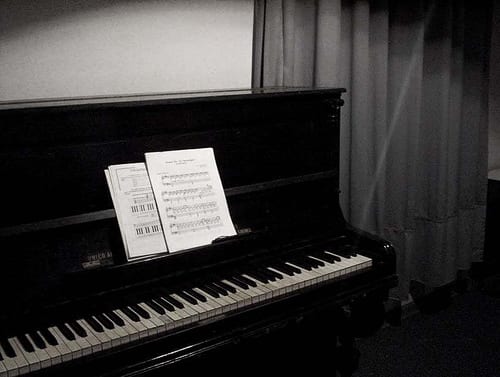 Feeling discouraged? You’re not alone. A couple of weeks ago we published an article about getting through tough piano passages, which got some great reader responses. But sometimes, the discouragement starts even before you start playing. Learning a new skill takes a lot of courage, and handling the beginner hurdles can make some beginner pianists run for the hills.
Feeling discouraged? You’re not alone. A couple of weeks ago we published an article about getting through tough piano passages, which got some great reader responses. But sometimes, the discouragement starts even before you start playing. Learning a new skill takes a lot of courage, and handling the beginner hurdles can make some beginner pianists run for the hills.
Maybe you’re worried about what your teacher will think when you make a mistake. Maybe you’re having trouble with training your fingers to reach a few of the notes. Perhaps even thinking about performing in front of an audience makes you break out in hives. Or maybe you’re worried about how you’re going to fit in all of this practicing into your day.
So how do you stay focused and motivated? Here are a few things keep in mind:
1. You don’t need to spend hours at the piano every day.
As long as you’re being smart about the way you practice, there’s no need to practice for hours on end when you’re first starting out. Those who try this might end up burned out, which then starts a cycle of ineffective practice, and from there it can be pretty hard to get back on track.
If you do feel like practicing a little longer than usual, remember to take breaks every now and then. Get up and walk away from the piano for a few minutes, relax your fingers, and regroup. Your hands – and your sanity – will thank you!
2. You don’t need to spend your entire practice session on difficult pieces.
Are your knees shaking at the idea of tackling the tough piece your piano teacher assigned you this week? If it helps you get through, consider getting comfortable first by starting your practice session with an easy song that you’ve already accomplished. There are tons of warm-up ideas you can use to ease your way in, or you can even start out with your favorite just-for-fun piece.
Of course, for some players, your practicing may be more effective if you jump right into the dreaded piece. The key here is to figure out what strategy works for you, stick with it, and make sure you keep that balance in your practicing.
3. Always remember: Piano lessons should be fun!
Learning to play an instrument is a very rewarding feeling, for students of all ages. While your teacher should be shaping your lessons to keep you motivated, it’s important to take note if you’re starting to feel your interest waning. Your teacher can work with you to reorganize your lesson structure, select new material, or revisit your goals to make sure the lessons are still fun and rewarding for you.
Readers, what words of encouragement can you offer to new piano players? Share the tips that have helped YOU – leave a comment below!
– Suzy S., TakeLessons staff member and blogger
You might also like…
– 5 Key Advantages of Taking Music Lessons as an Adult
– Excel at Music By Acting Like a Child
– 10 Ways to Spice Up Your Piano Scales
Photo by velvetLady.
Suzy S.
